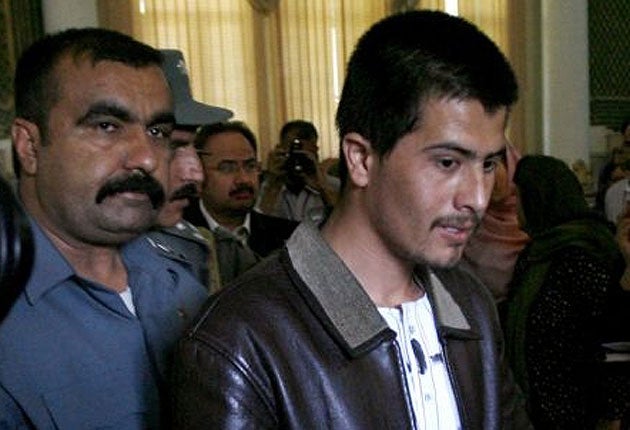Student facing 20 years in hell
Afghan court secretly sentences student whose cause was taken up by <i>The Independent</i>. His crime? To download article on women's rights

Sayed Pervez Kambaksh, the student journalist sentenced to death for blasphemy in Afghanistan, has been told he will spend the next 20 years in jail after the country's highest court ruled against him – without even hearing his defence.
The 23-year-old, brought to worldwide attention after an Independent campaign, was praying that Afghanistan's top judges would quash his conviction for lack of evidence, or because he was tried in secret and convicted without a defence lawyer. Instead, almost 18 months after he was arrested for allegedly circulating an article about women's rights, any hope of justice and due process evaporated amid gross irregularities, allegations of corruption and coercion at the Supreme Court. Justices issued their decision in secret, without letting Mr Kambaksh's lawyer submit so much as a word in his defence.
Afzal Nooristani, the legal campaigner representing Mr Kambaksh, accused the judges of behaving "no better than the Taliban". Hundreds of millions of dollars have been poured into Afghanistan's legal system and 149 British soldiers have died there since 2001, but experts admit that state justice is still beyond the reach of most ordinary Afghans.
President Hamid Karzai promised last year that justice would be done "in the right way", after worldwide protests at how Mr Kambaksh was convicted. But Mr Nooristani claimed yesterday that there was "no respect for the law", even in the highest court in Afghanistan. "They have ignored the principle of crime and punishment, they have ignored the principle of innocent until proven guilty. They have got the same mindset as the Taliban."
The Supreme Court's decision means Mr Kambaksh's best hope is now a presidential pardon, which will force Mr Karzai to choose between fundamentalists in his government and the rule of law. It has also raised serious questions over the millions of dollars spent on Afghan justice reforms since 2001, which appear to have been wasted. Mr Nooristani said: "The whole system is corrupt. Even with more investment, the system won't work."
Mr Kambaksh was found guilty of blasphemy and sentenced to death last year for circulating an essay on women's rights which questioned verses in the Koran.
It later emerged he was convicted by three mullahs, in secret, without access to a lawyer. The sentence was commuted to 20 years on appeal. At that appeal, in October, the key prosecution witness withdrew his testimony, claiming he had been forced to lie on pain of death. The prosecution then appealed to the Supreme Court to reinstate the death sentence. The defence appealed to quash his conviction altogether.
Meanwhile, the student has been languishing in a Kabul jail, fearing for his life. Islamic fundamentalists have been baying for his blood while moderate groups have led marches countrywide demanding his release.
In February, the Supreme Court Judge Bahauddin Baha vowed the appeal would be held in "a very open court" but that promise has proved hollow. Mr Nooristani said he was told of the verdict when he arrived to submit his written defence. And Mr Nooristani has himself been threatened. Prosecutors have warned him they are gathering evidence against him for "defending infidels".
Western diplomats insist they have been lobbying hard to have the case reviewed. But critics say their softly-softly tactic hasn't worked. "The Afghans know the money just keeps coming no matter what they do," said an American lawyer in Kabul.
Even if Mr Kambaksh wins an 11th-hour pardon, there are thousands of people just like him, convicted illegally, with no recourse, support or international scrutiny.
Mr Kambaksh's case has been passed to the prosecutors' office for "execution of the sentence", which means he could be moved to Kabul's notorious Pul-e Charkhi prison, or north to Mazar-i-Sharif, where he was first found guilty. Both hold murderers, rapists and violent Taliban sympathisers. Conditions inside are grim and both are prone to deadly riots.
A spokesman for the Supreme Court claimed there had been no irregularities in the case. But a spokesman for the British embassy said: "We have serious concerns about the fairness of Mr Kambaksh's trial. We continue to call on the Afghan state to comply with the international human rights standards, to which it is a party – this includes the right to a fair trial."
Our Pervez campaign
Worldwide outrage over Pervez Kambaksh's death sentence was sparked after The Independent reported his plight in January 2008. Our campaign led to the Afghan President Hamid Karzai being inundated with appeals, while political figures including the former US secretary of state Condoleezza Rice lent their support. The Government raised the matter directly with Afghanistan after more than 100,000 Independent readers signed the petition and in October 2008 a Kabul appeals court lifted the death sentence. The court ruled however that he should serve 20 years, which his lawyers contested on the grounds that it was unconstitutional.
Join our commenting forum
Join thought-provoking conversations, follow other Independent readers and see their replies
Comments
Bookmark popover
Removed from bookmarks